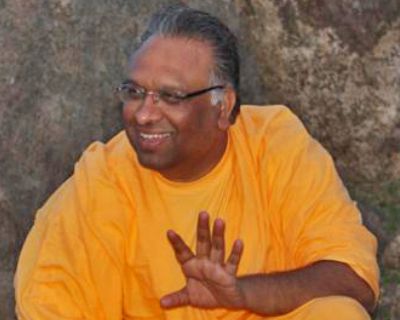Freedom from duties and responsibilities too cannot be the purpose of such a life. That too seems the immediate goal post for the one who is tied to duties, obligations, to something that he owes in return to what he has taken, or to responsibilities that cannot be relinquished midway.
Freedom from craving cannot be the point of Mokṣa—craving for pleasure, for power, for wealth, for eminence, for attention, for more and more strength in this world, for perfection. Because, even if you end the craving for a person, the person either loses value or goes away from your life; that is all. Nothing greater ever happens. If you give uppower, power goes away. If you give upwealth, wealth goes away; as simple as that. That achieves nothing.
Freedom from sorrow, hurt, inadequacy, desperation, decay, or obsolescence is not the purpose of spirituality; I mean the direct purpose of spirituality. Is it freedom from fear then? Fear of death, fear of disease, fear of being neglected, fear of being abandoned, fear of being lost or left alone, fear of losing value, fear of losing what has been gained or attained – so many are the fears. Is the purpose of Mokṣa, or the pursuit of Mokṣa, to get rid of fear once for all?
Freedom from crises? Freedom from internal turmoil or turbulence? Freedom from tearing conflict within? Is this the point of spiritual life? Some permanent peace or happiness?
Or, is it freedom from the wheel of births and deaths? But, most of us don’t even know—we don’t even have a premonition—of what awaits us after our death, all the more if we believe in life after death. We probably only fear the unknown. Because, we have sought to live a life of certainty all through our lives, haven’t we? Right from organising our finances for every possible eventuality, and securing family, pleasure, and steady income, to ensuring hotel bookings on a trip, to making sure that one catches the train by reaching quite early, to preparing oneself just before even meeting a casual stranger as if it were as important as a speech to be delivered at the UN—we have prepared, anticipated, worked out, created options, and organised certainty. Naturally, disease and death alone don’t seem to listen to us; they don’t sit quietly within the borders of certainty we create. Hence, the fear of the unknown! So, is Mokṣa freedom from such a fear?
The very word Mokṣa means liberation or freedom. Thus, it is natural one understands it as such. Freedom from everything.
Vyāsā, Śaṅkara, the Buddha and so many seers have repeatedly told us: this isn’t about freedom. This is about living and dying. Actually living and dying! Actually loving, and actually getting crushed. Actually showing enterprise; actually not seeking security. Actually being bothered about whether one is too selfish or self-obsessed. This is life, sir. Far more grave and profound than what we seek freedom from. The seers will tell you that you don’t even know what you seek freedom from. You don’t know love; yet you seek to be free of the issues in love. You don’t know what it is to lay one’s life at the feet of the Lord of the collective and allow Him to shape your identity, and yet, you have already sought to retire from this world of work, responsibility, and leadership. You know nothing of this universe or its order – you just don’t care – and yet, you either talk of systems and rules, or fret about how you are being troubled and stifled by societal regulations. You know nothing of pleasure or ecstasy, and yet, you are either scared or covetous about it.
You know nothing of yourself, and yet, you have made several estimates about yourself already. Such strong estimates that you would be insulted by someone who disagrees with that estimate of yours. Such adamant self-evaluations that you would be hurt if people don’t care to see your viewpoint. You know nothing of yourself, and yet you get insulted, you get hurt, you become defensive, you hate someone who doesn’t think well of you. Isn’t that ridiculous? Just think!
Sir, the diagnosis about all of us is out, in case you didn’t notice. We have erected something—some thought, some belief, some sentiment, some arrangement, some estimate, some fantasy, and we are just unwilling to let go. What is erected is being repeatedly asked by life to be given up; we don’t. Life regularly invites us to see and experience what exists; we don’t, we can’t, we won’t!
If you want to begin leading a spiritual life, don’t start with sincerity or commitment. Begin with honesty instead. Sincerity or commitment merely makes you proactive about a method, or lifestyle, or some value, or a way of thinking or feeling. That is a bigger deception. Start by being honest with yourself. Being honest with your Guru at least. Not weakly confiding, but being courageously honest. Straight!
Honesty is the first stepto genuine spiritual life. And, you must allow the honesty of the moment, the truth of yourself right now, to shape your life of today. That is how vulnerable spiritual life must be. Open to God and his thunderstorms always. Anything can be blown away, right this moment. Nothing is ever secured or hidden from Him ever.
The second stepis self-reflection. Lead life here not for achieving this or that, fulfilling this or that, or for attaining this or that. Lead life here to understand life itself. To be here, be here. Welcome life right now. Don’t live for something that you have erected within you. Stay in the open. Stay under the sky, in true space. Stay within striking distance of all natural elements. Don’t hide from life; don’t escape it. Don’t hope. Don’t give uptoo. Don’t vacate. Don’t stick. Don’t float. Don’t anchor. Lead life here such that you can see your reflection in it, moment to moment. That is a life of meditation.
Third, make it a point to seek great minds. Live for them. Live under them. Work with them. Work under them. Serve them. Volunteer to slave for them. Find the appetite to absorb from them ceaselessly. It doesn’t matter what you absorb now; the final picture of what you absorb will emerge much later. But, listen to them. Make it a point to understand them. Steer clear of the politics. Stay centred on true wisdom.
Fourth, don’t jumpto virtue or any practice directly. Honesty, self-reflection, vulnerability, and absorption from great minds—let these open virtue for you. Allow virtue to bloom. Allow life to find direction on its own. Don’t seek to lead this or that kind of life. Don’t attempt to patronise this or that kind of thought or feeling. Stay natural, stay yourself. Allow your entire personality to be first touched, opened, and collected. Allow the good forces of this world, of cosmic order, and those that hide within you today, to shape you well.
Don’t bother about the identity that gets created. Stay true to the pulse of life. Those who make perceptions about you will have to rework their perceptions again and again; they shall give upquickly, unable to make much headway.
Find the depths of life, discover its profound strength that neither assures nor is brute-like, find its expanse, find its height that both beckons as well as intimidates, find its true ground, find out how to touch and feel it intimately so you know, first-hand, that it is real and trustworthy, find light there—both the Sun and the enveloping light. Breathe the freshness of truth. Savour the taste of nectar. Find the pristine streams of life. Lead life unprepared. Stay without orientation. Yet, find coherence and clarity.
Discover life here. By immersing in it, by contemplating about it when you are ashore, by flying above it to see its entirety, by allowing it to attack you from all sides.








